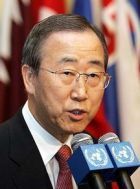UN chief to press Sudan for speedy deployment of Darfur force
September 2, 2007 (TURIN, Italy) — U.N. Secretary-General Ban Ki-moon heads to Sudan on Monday to press for speedy deployment of a 26,000-strong peacekeeping force in Darfur and a quick start to new peace talks to end the four-year conflict.

Reaching that goal will be difficult because Darfur is a vast and complex region where peace agreements and ceasefires have been ignored, lawlessness has increased, and more than a dozen rebel groups and government forces are still fighting. Ban has expressed deep concern at the recent escalation in violence that has led to hundreds of deaths in the last few weeks.
Nonetheless, the secretary-general said he chose this time to make the weeklong trip, which will also include stops in Chad and Libya, because of the “historic opportunity” provided by the U.N. Security Council’s adoption of a resolution on July 31 authorizing the 26,000-strong African Union-United Nations force. It will replace the beleaguered 7,000-strong AU force now in Darfur by Dec. 31.
The resolution was adopted after months of delay in getting agreement from the Sudanese government, and Ban said he wants to test the government’s commitment to speedy deployment of the AU-U.N. “hybrid” force.
Ban said deploying the force quickly will be “one of the largest and most complex field operations the United Nations has ever undertaken” because of the harsh environment and lack of water and communications, and “it cannot succeed without the cooperation of the government of Sudan.”
The secretary-general has been in Turin for a meeting with senior U.N. staff and was scheduled to fly to Khartoum on Monday.
Sudan’s U.N. Ambassador Abdelmahmood Abdalhaleem Mohamed said before flying from New York to Khartoum for the visit that the secretary-general “will find a committed Sudan to implementing the letter and the spirit of that resolution.”
He said Sudan would also like Ban’s visit “to ensure that the peace process is given priority,” to deliver on commitments to development and rehabilitation of Darfur, to come up with the financing for the hybrid force, and to ensure “the African character” of the hybrid force.
“The secretary-general will find a committed Sudan, committed leadership, committed people to peace. Whatever is required of us like water, land, whatever, we will generously do, because this issue is about the peace of Sudan, the peace of Darfur and the stability of the whole country,” Mohamed said.
Since taking the reins of the United Nations on Jan. 1, Ban has made Darfur a priority, working behind the scenes to help win approval for the hybrid force and appointing former U.N. General Assembly President Jan Eliasson to work with the AU’s Salim Ahmed Salim to try to revive negotiations among the warring parties.
The Sudanese government is to return to the negotiating table and in early August opposition leaders from Darfur met in Tanzania.
Ban said he wants to keep up the momentum and hopes the U.N. and AU will issue invitations “to a full-fledged peace conference” by the end of the summer” and to start political negotiations preferably during October.
During the trip, Ban plans to spend a day in Darfur and hold talks with Sudanese President Omar al-Bashir. He also plans to stay overnight in the southern city of Juba, where a 10,000-strong U.N. peacekeeping force is monitoring a fragile January 2005 peace accord that ended a 21-year civil war between Sudan’s Muslim government in the north and the mostly Christian rebels in the south.
In neighboring Chad, which has been affected by the spillover of the Darfur conflict, Ban said he will discuss the expected deployment of up to 3,000 European Union troops and 300 U.N. international police to help protect some 400,000 refugees and internally displaced people in Chad, and more than 200,000 displaced people in northern Central African Republic.
Ban’s final stop in Libya will focus on its important role in trying to get rebel groups in Darfur to join the government in new peace negotiations.
(AP)
